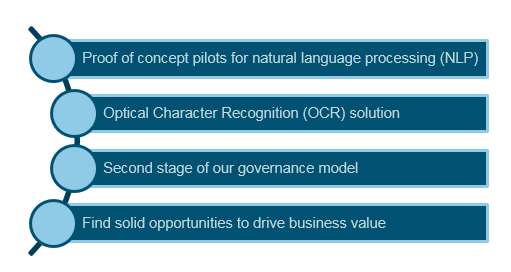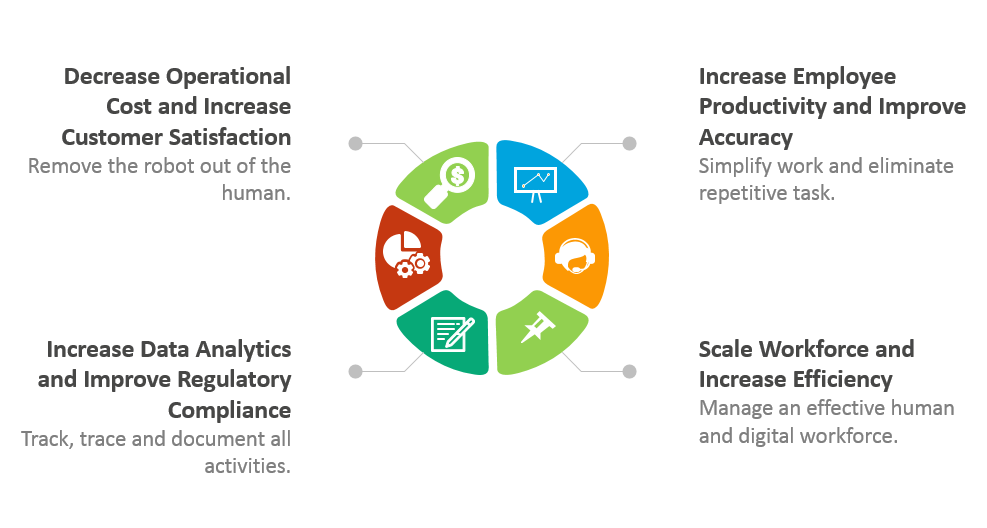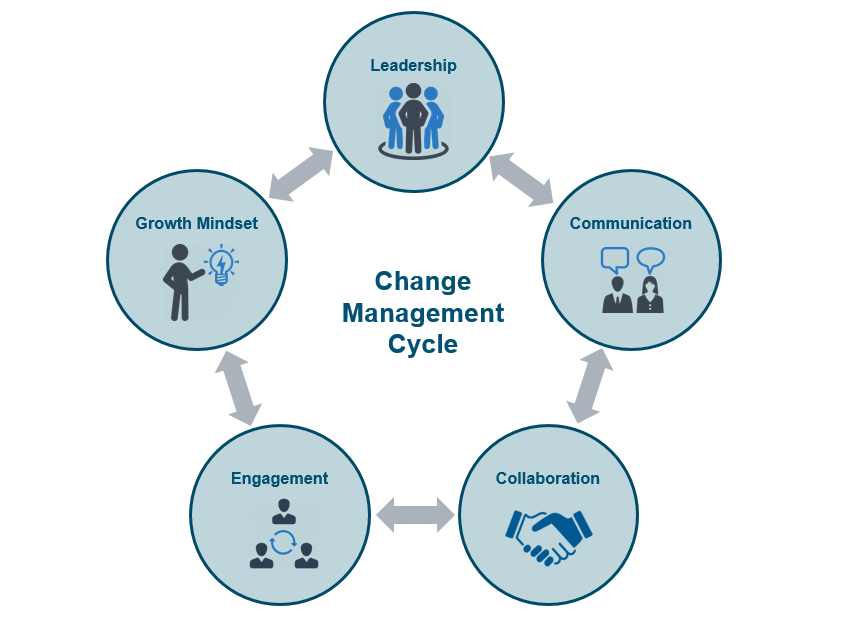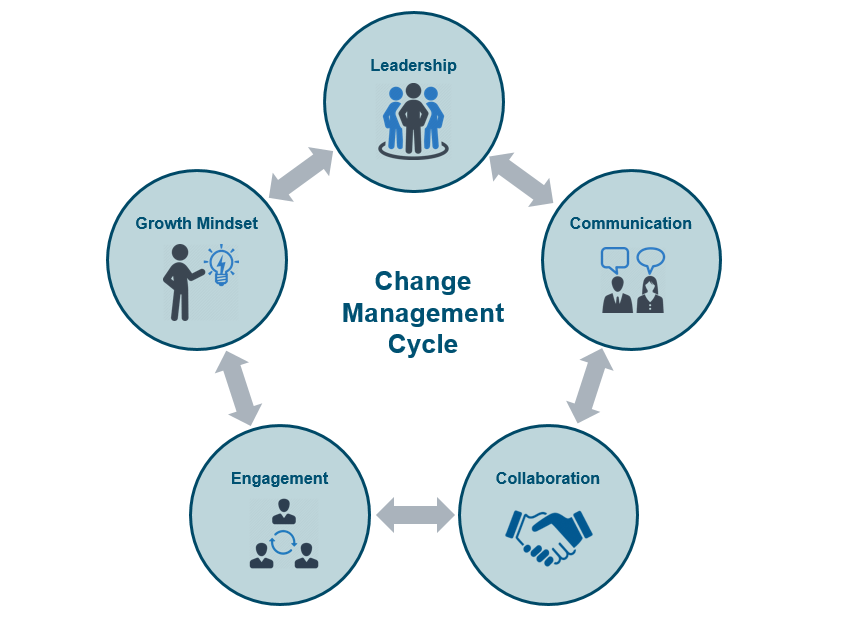We are a year and a half into our Digital Process Automation program and have had some very strong successes as we learn new tool sets, build our enterprise capability center for governance and stand up an Agile way of working. Year one (1) we delivered over $10M in returned value on an investment of $3M. That early success buoyed our enthusiasm and optimism. It also pushed us to strive for bigger and better successes for year two (2).
We knew maturing, scaling and sustaining the new capability was going to be our focus for year two (2). However, that early optimism had us more bullish than perhaps we should have been. We were a bit stymied on the slowing of momentum as new and different challenges presented themselves.
Here are some field notes of our journey to date. This year, as we endeavor to drive forward and unlock business value using RPA/RDA capabilities, coupled with AI for Intelligent Automation, we have stepped back to assess, adjust, and learn.
Maturity:
The road to maturity has been well planned and we have worked with several external experts to help us define our strategy and roadmap. It all seemed appropriate and built on a solid foundation that we had established in year one (1).
We started embarking on a multi-tool strategy, conducting proof of concept pilots for natural language processing (NLP) and finding an Optical Character Recognition (OCR) solution. We also began to build out the second stage of our governance model and engaging other divisions to find solid opportunities to drive business value.

Our learnings so far:
- Managing a few bots vs. many across numerous back end systems, without appropriate dashboards and insights made it challenging to get quickly to root cause when bots stopped or were experiencing difficulties due to the slowness of the core back-end systems
- We lost some opportunities when we began building from point process bots vs. end to end process bots. We are now shifting to end to end and increasing opportunities to build in a modular way for re-use
- Learning curve for managers, end users, development teams and business process consultants. We underestimated the lift, even with a robust change management program
Scaling and sustaining:
Scaling bots and sustaining momentum over time is something we have been paying particular attention to, since we began the program. Even so, we are still facing situations we didn’t think we would, as we continue to learn how to best use the capabilities within our core system environments. It has been a journey of learning and testing quickly what will work and not work.
As we do this, we also are realizing that, although the time to develop and deploy is much more expedient than our typical software development solutions, when you employ the same thinking used in that build environment, your bot approach gets bogged down by an expectation of perfection.
Our learnings so far:
- Scaling across an enterprise and introducing capabilities too soon, even within your chosen toolkit, can slow down momentum and erode confidence by the business teams when you experience “bumps in the road”. This takes time and focus, and although we did assign people full time to the work, it wasn’t in all the places necessary, therefore the expansion has been slower than planned
- Tool vendors often over-state the capabilities they have, and under-state the effort required to display. It leads to erosion of confidence in the tools and also increased skepticism from business areas that this will help them achieve their business value
- When faced with ongoing challenges, from technical environments, expectation mis-alignment, and the pace of the overall change effort needed to get value, can negatively impact momentum and excitement
- Building out the appropriate orchestration and insight tools, given they don’t fully exist in the toolsets, required us to develop a home grown solution
- Complexity burden of solution vs. using other more comfortable tooling like scripting and easier tool kits can reduce the pipeline of opportunities
- Underestimated the change magnitude of shifting to a true Agile approach, to include quickly iterating and getting a Minimal Viable Bot (MVB) online quickly, with follow up sprints to add functionality

Bringing the learning together:
If you are embarking on the journey of a Digital Process Automation solution, getting to the next level of maturity and employing Intelligent Automation is a big lift. Don’t underestimate the effort and focus your company needs to have, as well, as the expertise that will be needed to truly unlock business value at a rapid rate. The tools, although getting better and better, are not plug and play, and getting to the AI tooling requires a deeper level of thinking, to be able to build out models and train the systems.
When looking at the change your organization will need to make to support adoption, learning and growth of your people, don’t underestimate the amount of re-training or perhaps, reframing, in how problems are solved and approaches taken. If your business teams bring in a mindset to classic development of software, and try to define and account for all scenarios, not only will the scope of your bots be lengthy and complex, they will have a higher failure rate. It is easy to fall into the “what we know is all there is” mindset, vs. the much needed growth mindset in this work. Program implementation leaders have the responsibility to train, support and mentor how these capabilities are different and what solutions are possible with these new tools. In addition, roles for leadership and the overall workforce will change and evolve as your program does. Therefore, having a strong partnership with HR is critical to the program’s success as well.
Remembering that your digital workforce (a.k.a. bots) are not only simulating what your human workforce is doing, but also working side by side with your human workforce. In that context, humans that are processing work, are in essence processing system defects. In other words, they are working on those situations that could not already be coded into your core application. Therefore, automating this work is going to be largely decision based, harder to fully design all scenarios, and be a learning journey. The focus here then shifts to quick cycle times of improvements and getting your Agile team as close to the end user as possible, to be able to observe the work and determine what decisions they are making unconsciously. The question of “Why are you…” should be at the forefront of the dialogue with the human workforce.

Digital Process Automation tools are really a great driver to reduce cost, increase productivity, increase quality and increase employee satisfaction. When you are taking the robot out of the human, and giving the mundane tasks to a digital worker, you can be in a win/win situation. In order to unlock the full value of these tools, it takes a large investment of time, energy, passion, persistence, focus and collaboration across business and technical teams. Developing strong partnerships with those companies that have a solid track record of deploying at scale is vital to success.
A Digital Process Automation program is a business transformation and therefore a strong focus on change management is another key to success. It is a journey and a continuous process of learning and adapting to help your employees and your organization thrive.


















